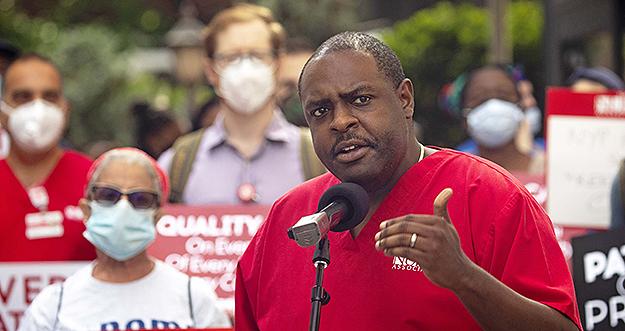With psych units closing, nurses speak out

At the height of the COVID surge, psych and detox units around the state were converted to treat COVID patients. They now sit empty as the surge has subsided. However, these units have not been reopened. Many major health systems are using “COVID Surge Plans” to keep them closed, effectively denying inpatient mental healthcare to numerous communities.
It’s part of a longstanding effort by hospitals to shed their psych facilities, deemed a drag on the bottom line. The Berger Commission, committed to so-called “right sizing” hospital care, ushered in a decline in psych beds. By 2014, NY underwent a 20% reduction in inpatient psych beds. That trend has continued.
No place for vulnerable patients
Lisa Landes, RN, formerly a psych nurse at Health Alliance Hudson Valley (HAHV) in Kingston, was one of 35 nurses who lost jobs in June, as the acute unit was completely shutdown. “Current events have exacerbated the unseen mental health epidemic, compiled with the closing of inpatient behavioral health beds. More than ever, behavioral health services are needed. To properly serve a community, we need the full spectrum of behavioral health services, i.e. inpatient, partial, and outpatient and other community services. To remove or decrease access to these services is detrimental and dangerous.”
Less profitable psych and detox care are becoming unavailable to a vulnerable patient population, while lucrative surgical services are reopening. The COVID-19 pandemic and the related economic fallout will undoubtedly increase the need for inpatient psych services, and advocates are concerned that these services will not be there at the very time community need is mounting. These closures represent a longtime pattern of fewer beds, centralization of care away from communities and, ultimately deinstitutionalization.
NewYork-Presbyterian Brooklyn Methodist Hospital eliminated 50 beds. Hospital administration claims that half of the psych beds will be closed for 12-18 months, and the remaining 25 beds longer.
“All government and health experts have pointed to the need for increased psychiatric beds and services as we see a dramatic increase in anxiety, depressive disorders, suicidality, domestic violence and substance use disorders. Our patients, many who are from the community and neighboring underserved communities are being transported from our emergency rooms elsewhere. Here at their local hospital we have built trust and confidence with the healthcare team,” said Irving Campbell, RN, Methodist Hospital. “We are seeing many of our patients in the streets in acute state when they should be receiving care in the hospital. Many are remaining in the ER for lengthy periods of time and then discharged back out without services.”
Emergency rooms no substitute
“Since COVID 19 restrictions have been lifted, there has been an increase in psychiatric visits to HAHV ED,” said Deborah Barton, RN. “Patients had been afraid to come to the hospital and are now experiencing distress and bothersome symptoms such as increased anxiety, depression, and loneliness, from a lack of follow up health care as a result of months of home isolation. I’m advocating for the entire Ulster County community, especially the underserved populations, and the need for return of psychiatric and detox inpatient beds to HAHV. Now Ulster County, population 200,000, has no inpatient psychiatric care.”
Barton says that HAHV patients are mostly being transferred out of the area to Westchester Medical Center, a disruption in continuity of care and resources for discharge planning as well as the ability for family participation and support in the healing process, all critical in psychiatric care.
Many end up in jail
Nurses from NYSNA and mental health advocates from National Alliance on Mental Illness (NAMI) are speaking out to protect patients and to say to hospital systems: stop exploiting COVID care to shutter psych and detox services.
In NYC, over 50% of 911 mental health callers end up in the hospital, and many wind up in correctional facilities.
“What has truly outraged me is the blatant disregard for black and brown incarcerated individuals with serious mental illness by the providers who are entrusted to deliver their care,” said Alicia Butler, RN, Rikers Island. “The quality of care is subpar and irresponsible. This is unacceptable and has become a personal fight for justice for me.”